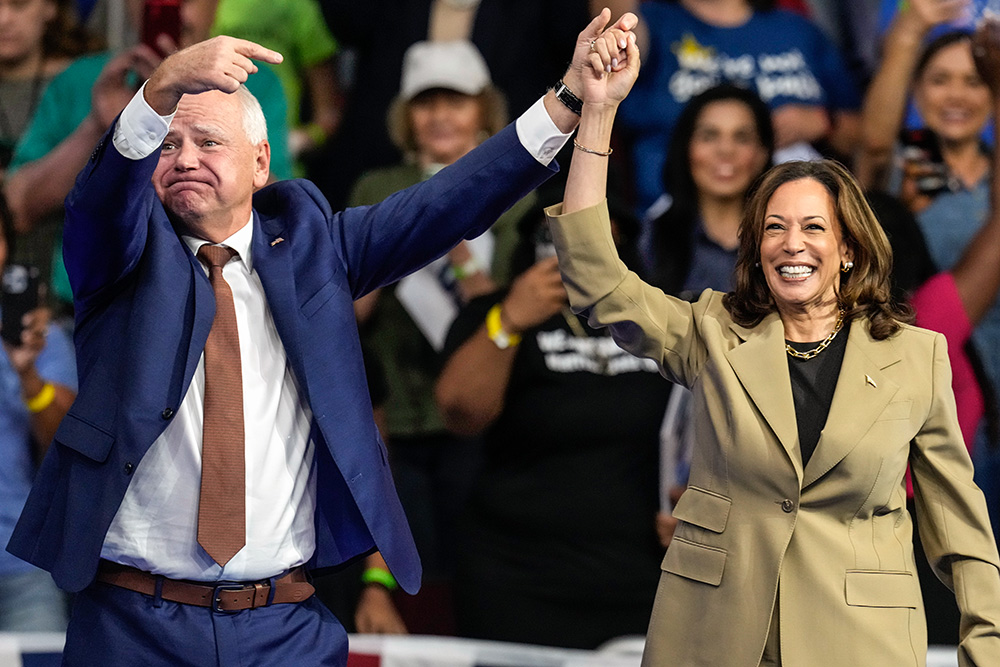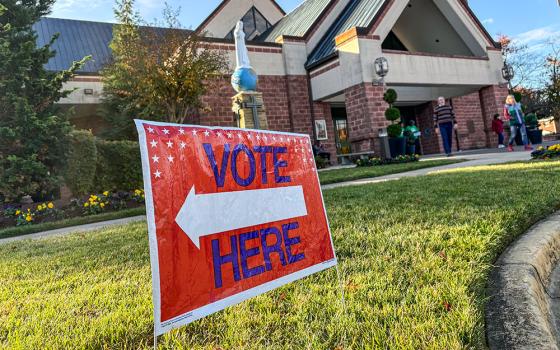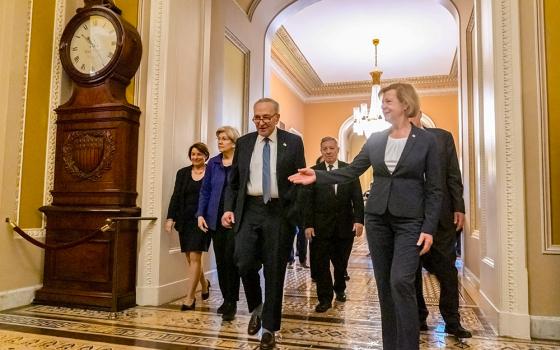
Democratic presidential nominee Vice President Kamala Harris and running mate Minnesota Gov. Tim Walz arrive at a campaign rally at Desert Diamond Arena Aug. 9 in Glendale, Arizona. (AP/Ross D. Franklin)
Kirby Hoberg, a 34-year-old mom of four, wasn't excited about voting in the presidential election this year.
A registered independent who tends to "lean Democratic," Hoberg had been planning to vote for President Joe Biden, albeit without much fervor. But when he stepped aside, and the new team of Vice President Kamala Harris and Minnesota Gov. Tim Walz emerged, Hoberg became much more enthusiastic about the Democratic ticket.
A self-described "big fan" of Walz, she praises his record of providing social safety net benefits that are important among her circle of struggling millennial families in suburban Minneapolis — things like parenting leave, paid sick leave, free school lunches, and a state-run health insurance option not tied to employment.
These are also issues that she knows benefit the common good and fit with her understanding of Catholic social teaching. "I think a lot of Catholics accept that neither party is all that great, but the Democrats have more of a chance than the Republicans to potentially do something different," Hoberg said.
Younger voters who support the Democratic ticket expressed to NCR that a candidate's overall values, especially on social issues, are more important than any individual issue, such as abortion. And a prospective president's character is more important than their personal religious faith, according to young Catholics and experts who spoke to NCR.
Catholicism is "not just a box to be checked," said Harry Glynn, who graduated a year ago from Creighton University in Omaha, Nebraska, and now is a volunteer teacher at the border in Brownsville, Texas. "That's not as important as the way that you're living."
'I think a lot of Catholics accept that neither party is all that great, but the Democrats have more of a chance than the Republicans to potentially do something different.'
—Kirby Hoberg
As the Democratic Party gears up for its convention Aug. 19-22 in Chicago, polls — not to mention memes and the "vibe" — indicate a growing enthusiasm for Harris and Walz, especially among younger voters. A recent national poll that showed Harris with a four-point overall lead over Trump also gave her a nine-point lead among voters under 35. Polling in the swing state of Wisconsin indicates that Harris outperforms both Trump and Biden, especially among voters under 30. Young voters are also telling pollsters that they're more likely to vote since Biden stepped down.
On social media, Harris is connecting with pop culture, whether it's with "Brat summer," the color green or coconut tree emojis. Walz, for his part, is rocking the cool dad memes. It's more than fun; it's a political strategy, given that more than a quarter of young people say that social media influences their opinions about political issues, according to a recent study by SpringTide Research Institute.
That study, conducted last winter and spring, also found that young people were unhappy with U.S. partisan politics, said SpringTide's senior researcher Nabil Tueme, a sociologist. "They were really looking for something different than the things they were observing," she told NCR.
Yet the stereotypes of young people as either politically apathetic or zealots are not accurate, Tueme said. Despite their perception of partisanship and incivility in politics, coupled with low trust in institutions overall, only 6% of respondents reported not caring about any political issues, she said.
"We found that they care deeply about our shared politics and communal world in ways that were really complex and nuanced," Tueme said.
'They want someone who is a bridge builder, who is empowering of young people and very cognizant of women's issues and inclusive of LGBT people.'
—Jesuit Fr. Martin Ngo
Jesuit Fr. Martin Ngo, who has worked in campus ministry and now teaches in the School of Film and Television at Loyola Marymount University in Los Angeles, says younger voters are looking for politicians who can communicate effectively and radiate authenticity.
"They're yearning for someone who makes sense to them. They want someone who is a bridge builder, who is empowering of young people and very cognizant of women's issues and inclusive of LGBT people," he said.
Ngo wonders if Walz's "cool dad" persona satisfies a need for sanity amid political infighting and resignation. "There's a breath of fresh air behind that," he said. "It's nice that someone can be a figure that can rekindle a sense of 'home' in our country."
Glynn agrees voters in his generation are looking for authenticity and can sniff out hypocrisy. But as a former intern for the Catholic Climate Covenant, he also has a number of issues that drive his vote: the environment, immigration, affordable housing, health care and education.
"I'd like to see both parties get back to bread-and-butter issues that average Americans care about," said Glynn, who grew up in a small town in Kansas "with 2,000 people, no stoplights and no restaurants," where the "Democratic Party feels very coastal."
"However, as Catholics in the United States, we don't fit neatly in either national party," he said, adding that he values the sanctity of human life, from conception to natural death, but not skipping over everything in between. "To say we're pro-life, it must be more than anti-abortion for it to be truly Catholic."
'Younger Catholics, in general, are multi-issue voters. It's really about the issues that are affecting everyday Americans.'
—Chris Carroll
Younger voters — including many Catholic ones — are focused on social justice and economic issues, said Chris Carroll, a 33-year-old member of Catholics Vote Common Good's executive board.
"I don't think that Harris' stand on abortion is something that would prevent them from voting for her," he told NCR. "Younger Catholics, in general, are multi-issue voters. It's really about the issues that are affecting everyday Americans."
For Jacqui Skemp, who considers herself "trad adjacent" and attends a parish with the Latin Mass, abortion is a secondary issue. "I know that for many Catholics, the primary issue is the pro-life stance of the two parties," she said. "But I'm convinced that the Democratic ticket is going to provide more resources for immigrants, for the poor, for the elderly and for veterans. Those are some of the concerns for me."
A mom in her 40s who lives in Minneapolis, Skemp has voted across party lines, and her vote for Biden in 2020 was the first time she had supported a Democratic nominee for president. It was, she said, and "anti-Trump vote."
This election, preservation of democracy is Skemp's biggest concern. "I think the greatest damage Trump has done is to have eroded Americans' trust in the electoral process," she said. "So having people run for office who trust the process is valid and will work is pretty important to me."
Advertisement
That Harris would be the first African American woman president seems to be a "nice to have" but not critical to young Catholics' support for her, Skemp said.
Hoberg, whose heritage is with the Ponca tribe of Oklahoma, says a woman president would be exciting, as would having a Native governor in Minnesota. If Harris and Walz were to win, Minnesota Lt. Gov. Peggy Flanagan would become the first Native American woman to lead a state.
For 18-year-old Cyrus Keels, who is still undecided, an African American woman as president would be "a good historic achievement," but won't tip the scales in his decision. "I still have questions that need to be answered from both candidates," says Keels, an African American who will be a freshman at the University at Buffalo, New York, in the fall.
He says his views on issues such as the economy, immigration, and war and peace come from his "moral compass," not directly from any religious teaching.
But even if many young Catholics are not looking to the bishops' conference for political guidance, some are wondering if the bishops will have any public statement about the race. "A lot of people I know are watching to see if they take a stand against Trump's extremism," said Hoberg, "or if we're just going to get a lot of quietness."








